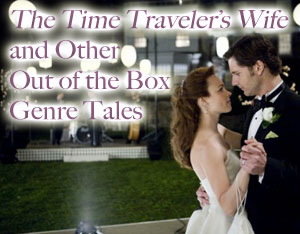 The other night I finished reading Michael Crichton’s novel, Next.
The other night I finished reading Michael Crichton’s novel, Next. And it got me to thinking.
1. Is this book truly a novel? Although interesting, entertaining and all the other things a good read should be, it felt more like a collection of interconnected short stories. There really was no primary story or plot to the manuscript, other than an over-arching idea about where genetics and genomics is taking society. (Not a pretty sight, I might add.)
2. Is this book standard literature or is is science fiction? I’d have to say it is both. Crichton’s work is often used as an example of science fiction that appeals to the masses because it doesn’t necessarily read like science fiction.
Of course, as lovers of SF we all know that’s a lot of hooey. The basis of science fiction — at least good science fiction — is taking science fact and extrapolating from there. It does not need to be set far in the future, nor does it need to be populated with aliens, interplanetary travel or the like.
Take The Time Traveler’s Wife by Audrey Niffenegger. I finished reading this book in March and have been singing it’s praises ever since. It was an amazing book. And a very well written piece of science fiction, but you won’t find it among the other books in that genre area of the book store, for it was marketed as traditional literature.
The underlying premise is the story of a man who travels through time due to a genetic mutation. But that is only the backdrop.
The story is really about love and fate. Do we have a choice in who we fall in love with? In fact, do we have a choice in anything about our lives at all?
Now the book has been made into a movie starring Eric Bana as the time traveler, Henry DeTamble, and Rachel McAdams as his wife, Clare. And I admit I look forward to seeing the film … I was that much in love with the book.
As with so many time travel stories, following the time line can get pretty confusing at times. Who’s time line do you follow? Henry’s? Clare’s? And from what point in time do you start to follow it? The future becomes the past and the past becomes the future, depending on who you follow and when you follow them.
Niffenegger did an excellent job of feeding the reader each piece of the puzzle at just the moment you needed to read it, using the flexibility of the time line to create anticipation for later, driving you further into the book and the story.
So, here’s a really good book (did I mention I really liked it?) that most science fiction fans would enjoy reading, but they won’t find in their favorite nook of the bookstore. In fact, you most likely won’t find any of Crichton’s work there either … even though that’s pretty much what he writes most of the time (not all the time, but quite a lot).
What other wonders do the mundane sections of the book store hold? Here are a few I could think of:
- The Road
by Cormac McCarthy, a post-apocalyptic tale that was on the Oprah’s Book Club list, and has been made into a move
- Several works by Margaret Atwood, most notably The Handmaid’s Tale
- Several novels by Kurt Vonnegut, including Slaughterhouse-Five: A Novel
and The Sirens of Titan: A Novel
- Alas, Babylon
by Pat Frank, another “after everyone is dead” tale
- Nineteen Eighty-Four
and Animal Farm
by George Orwell (You can purchase both books in volume here
.)
- Brave New World
by Aldous Huxley
And please, if you can name any more, please share them as a comment to this post. I’m sure all of us genre travelers would love to discover yet another great travel read!
For more on this topic, check out For the love of Scifi by Boston’s Sci Fi Examinar, Tina Sena.
You also might want to read Why Do People Not Read Science Fiction? Reading from only one side of the brain” by Carol Pinchefsy.

Pingback: The Genre Traveler » Podcast Episode 15: Alien Manipulation of Human DNA